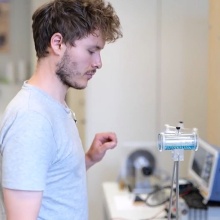Vibrations in machines or squeaking disc brakes: technical systems are being manufactured using increasingly light components and are subject to ever greater stress. Lightweight structures, for example, make vehicles more susceptible to vibration or cause more noise. But what can researchers do to counter this?
In 2016, the German Research Foundation (DFG) established the program SPP 1897 entitled "Calm, Smooth and Smart: Novel Vibration Control by Means of Targeted Dissipation". Here, scientists investigate how they can influence the vibration behavior of mechanical components by studying physical processes for practical applications in everyday life. The program is now approaching the end of its second funding phase. Prof. Peter Eberhard from the Institute of Engineering and Computational Mechanics at the University of Stuttgart is responsible for the coordination: "Through the cooperation of scientists from all over Germany, intensive basic research has significantly improved our understanding of absorption. This enables the development of new applications and enhancements to existing systems."


